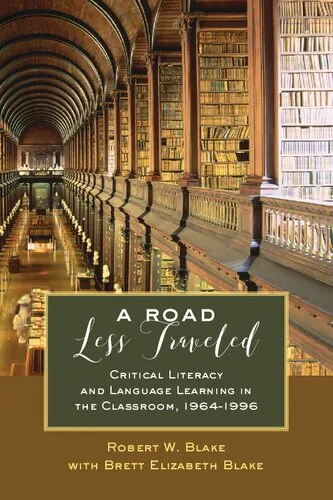A Road Less Traveled: Critical Literacy and Language Learning in the Classroom, 1964–1996
4.4
Reviews from our users

You Can Ask your questions from this book's AI after Login
Each download or ask from book AI costs 2 points. To earn more free points, please visit the Points Guide Page and complete some valuable actions.Welcome to the world of critical literacy and language learning through an enriching journey that spans over three decades. "A Road Less Traveled: Critical Literacy and Language Learning in the Classroom, 1964–1996" is a comprehensive exploration of how language education has evolved, influenced by socio-cultural factors, and shaped by critical teaching methodologies. This introduction offers a panoramic view of the book's essence, inviting educators, students, and literary enthusiasts to delve into its profound insights.
Detailed Summary of the Book
In "A Road Less Traveled," we dive deep into the transformative years between 1964 and 1996, a period marked by significant shifts in educational paradigms. This book chronicles the evolution of language learning practices, highlighting the increasing importance of critical literacy in classrooms. Through a detailed analysis of educational reforms, pedagogical strategies, and case studies, we explore how educators sought to empower students to critically engage with texts and ideologies. Emphasizing the role of culture, power, and identity, the book sheds light on how teachers can nurture students' critical thinking skills and language proficiency simultaneously.
The narrative unfolds in a sequence of thematic chapters that each highlight a critical juncture in the history of language education. Through personal anecdotes and scholarly research, we illuminate how societal changes—such as civil rights movements and globalization—impacted educational priorities and practices. The book places particular emphasis on the interconnectedness of language and power, proposing that effective language teaching should challenge dominant narratives and encourage diverse voices.
Key Takeaways
- Critical literacy enables students to analyze and question societal norms reflected in language.
- Language education should incorporate socio-cultural contexts to enhance learning outcomes.
- Empowering teachers with critical pedagogical tools is essential for nurturing a generation of critical thinkers.
- Incorporating diverse perspectives within language curriculums broadens students' understanding of global cultures and ideologies.
Famous Quotes from the Book
"Language is not merely a tool for communication; it is a lens through which we perceive and construct our world."
"In cultivating critical literacy, educators are not just teaching language skills; they are empowering students to become architects of change."
Why This Book Matters
This book stands as a critical contribution to educational literature, particularly in the fields of language arts and pedagogy. By bridging historical context with modern-day implications, "A Road Less Traveled" offers valuable insights for educators seeking to enrich their teaching practices. It underscores the importance of viewing language learning not only as an academic requirement but as a vehicle for personal and social transformation.
Moreover, the book encourages dialogue among educators about the ongoing relevance of critical literacy in an increasingly globalized world. As classrooms become more diverse, understanding the intersection of language, identity, and power becomes crucial. This work highlights the necessity of equipping students with the skills to navigate and critique the complex texts that shape their lives, thus reinforcing the enduring impact of critical literacy on society.
Free Direct Download
You Can Download this book after Login
Accessing books through legal platforms and public libraries not only supports the rights of authors and publishers but also contributes to the sustainability of reading culture. Before downloading, please take a moment to consider these options.
Find this book on other platforms:
WorldCat helps you find books in libraries worldwide.
See ratings, reviews, and discussions on Goodreads.
Find and buy rare or used books on AbeBooks.
1185
بازدید4.4
امتیاز50
نظر98%
رضایتReviews:
4.4
Based on 0 users review
"کیفیت چاپ عالی بود، خیلی راضیام"
Questions & Answers
Ask questions about this book or help others by answering
No questions yet. Be the first to ask!


